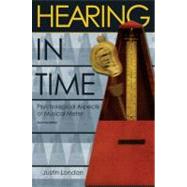Hearing in Time Psychological Aspects of Musical Meter
, by London, Justin- ISBN: 9780199744374 | 0199744378
- Cover: Paperback
- Copyright: 5/3/2012
Our sense that a waltz is "in three" or a blues song is "in four with a shuffle" comes from our sense of musical meter.Hearing in Timeexplores the metric aspect of our musical experience from a psychological point of view. Musical meter is taken as a musically-specific instance entrainment, that is, our more general ability to synchronize our actions to the rhythms around us. As such, musical meter is subject to a number of fundamental perceptual and cognitive constraints. These constraints are the cornerstones ofHearing in Time'saccount of musical meter.Hearing inTimealso takes into account the fact that listening to music, like many other rhythmic activities, is something that we do a lot. It also approaches musical meter in the context of music as it is actually performed, with nuances of timing and dynamics, rather than as a theoretical ideal. Hearing in Time'sapproach to meter is not based on any particular musical style or cultural practice, and so it discusses musical examples from a wide range of musical styles and cultures--from Beethoven and Bach to Brubeck and Ghanaian (Ewe) drumming. In taking this broad approach a number of fundamental similarities between a variety of different metric phenomena--such as the difference between so-called simple versus complex or additive meters--become apparent. Hearing in Timeis written for musicians, musicologists, music theorists and psychologists who are interested in rhythm and meter. Only a modest ability read a musical score is presumed, and most musical examples are taken from familiar popular and classical repertory.







